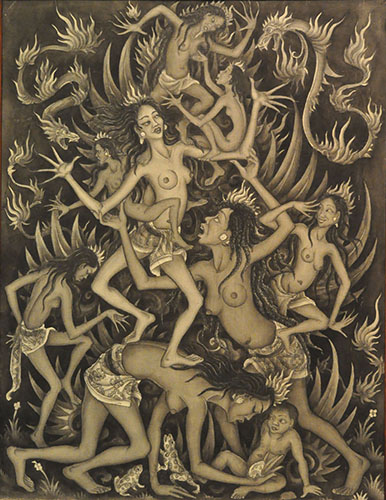Iram, the lost city
Marten van den Berg

Illustratie: Ida Bagus Made
The story of Iram is one of the most intriguing stories of Islamic lore. Finding Iram would be the Islamic equivalent of finding the Ark of the Covenant, or the Holy Grail of the last supper. Iram begs to be visited by Indiana Jones. The story is told in night 277, 278 and 279 of the 1001 Arabian Nights.
It begins with a man searching for a stray she-camel in the desert of Yemen. There, in the middle of nowhere, he comes upon a city built of gold, filled with pearls, incense, precious stones, streams and canals, and trees with ripe fruits. He leaves the city to tell the Caliph. The Caliph calls for Ka’b al Ahbar for advice, and Ka’b recognizes the city as Iram, the city of columns.
Amazing story
Iram was built by Shaddad ibn ‘Ad, an ancient king who ruled over the entire world and all its peoples. When Shaddad hears of paradise, he decides to build it here on earth. After 320 years of building, the city was completed. After completion, Shaddad moves to the city to install himself there as ruler of the world. However, just before they reach the gates, God issues a cry from heaven and Shaddad and all his companions are killed. All trace of the road to the city is erased, but the empty city remains somewhere in the Yemeni desert, waiting there until Judgement day.
This amazing story has ancient roots, as Iram is also briefly mentioned in the Qur’an. In surah 89 it stands in a line of peoples punished for their wickedness:
Dost thou not consider how thy Lord dealt with (the tribe of) A’ad,
With many-columned Iram,
The like of which was not created in the lands
(Qur’an 89:6-8, Pickthall translation)
Replica of paradise
In surah 7:65, the prophet Hud is sent to the people of ‘Ad, and in verse 70 it is revealed why the people of ‘Ad were ultimately destroyed, as the people of ‘Ad respond to the prophet Hud:
They said: Hast come unto us that we should serve Allah alone, and forsake what our fathers worshipped ? Then bring upon us that wherewith thou threatenest us if thou art of the truthful! (Qur’an 7:65, Pickthall translation)
This poses some difficulties: The prophet Hud is not mentioned in the Nights story and more importantly, the reason of ‘Ads destruction in the Qur’an is polytheism, and not creating a replica of paradise. Perhaps we have to look elsewhere for the roots of the story.
Tower of Babel
One hint comes from the scholar narrating the story, Ka’b al Ahbar. He was a Jew who converted to Islam and he was considered to be an expert on biblical lore. And the Bible does contain a story of a lost city in connection with reaching for heaven: the story of the city of Babel.
The story of Babel is told in the book of Genesis, chapter 11. At the time, all people were united and of one language, similar to the united people of the world in the Iram story. The people of Babel decide to build a tower so high, they could reach the heavens. In the context of the Babel story, the heavens are not paradise, but merely the abode of God. Still, humans are not allowed to get into the heavens, just as they are not supposed to have paradise on earth. Therefore, before the tower could be finished, God halts the progress of building:
And the LORD said, Behold, the people is one, and they have all one language; and this they begin to do: and now nothing will be restrained from them, which they have imagined to do. Go to, let us go down, and there confound their language, that they may not understand one another’s speech. So the LORD scattered them abroad from thence upon the face of all the earth: and they left off to build the city. (Genesis 11:6-8, KJV)
Story of Noah
Although the specifics of the story are different, the motif is the same: a unified humanity crosses the line by building a city, and God punishes them for their arrogance.
The Qur’anic timeframe also connects Iram with the tower of Babel. In surah 7, the story of the tribe of ‘Ad is placed before the story of Lut (Lot), and after the story of the people of Nuh (Noah). In the Bible, the story of Babel occurs just after the story of Noah, a few chapters before the story of Lot. A nice detail is that Shaddad ibn ‘Ad apparently lives longer than the 320 years it takes to build the city. This extreme lifespan is in tune with Genesis narrative, where the patriarchs also live for hundreds of years.
Preaching against polytheism
Finally, in another story within the 1001 Nights, a number of people are mentioned as living in a garden of Iram, in the city of Babel. Moreover, Iram here is also the name of the son of ‘Ad the great (see for example night 762 and 763). This connects Iram and ‘Ad with Babel, but only in name. Babel/Iram in this story, in contradiction to the earlier Nights story, the Bible and the Qur’an, still exists, is inhabited and can be visited.
So perhaps Ka’b al Ahbar retold the motif of human hubris in the tower of Babel, combining it with the story of Iram from the Qur’an. In the process of doing so, he deviated from the basic Qur’anic narrative of the prophet Hud preaching against polytheism.
Movie material
In any case, he greatly improved the story: Iram is snatched away just before the eyes of the arrogant Shaddad, and the idea of a lost city in the empty quarter, hidden between the sand dunes is great movie material. Just like the Holy Grail and the Ark of the Covenant, Iram will probably never be found.
But perhaps, one day, a lonely traveler will come home with a story of an empty city he stumbled upon in the desert. You never know.
Marten van den Berg is a Frisian and studies medicine.
English, Marten van den Berg, 31.08.2014 @ 09:12






 RSS
RSS